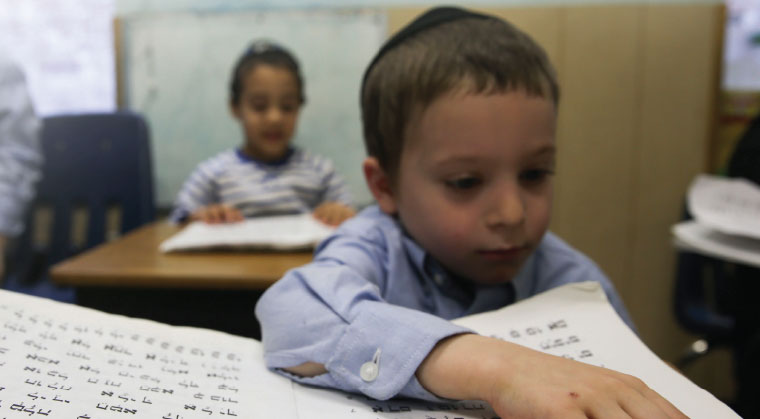Yeshivos Win Big in Federal Court


The decision by a Brooklyn federal judge to dismiss a lawsuit challenging the so-called Felder amendment represents a dramatic victory for yeshivah education.
The suit, brought by the advocacy group YAFFED, claimed that the amendment signed into law last April (and named after state senator Simcha Felder) gave preferential treatment to certain yeshivos by reducing the amount of secular studies they must teach.
But Judge I. Leo Glasser of the United States District Court for the Eastern District of New York threw out the case on jurisdictional grounds, holding that plaintiff YAFFED lacked adequate standing to bring the lawsuit. Avi Schick, a partner at the Troutman Sanders law firm, who submitted an amicus brief and took part in oral arguments on behalf of a group of Orthodox organizations including PEARLS (Parents for Educational and Religious Liberty in Schools), Agudath Israel of America, Torah Umesorah, and UJO of Williamsburg, says the case’s dismissal, albeit for jurisdictional rather than substantive reasons, is highly significant.
First, it represents a resounding defeat for YAFFED in its years-long, high-visibility battle in both the courts and in the media against New York yeshivos. “After three years of strident threats of legal action,” Schick says, “YAFFED brought this suit amid great media fanfare, recruiting a major law firm to provide it with pro bono representation. Footsteps [a group that advocates for the non-Orthodox] also joined in as an amicus in support of YAFFED’s position, and it too was represented by yet another major law firm. And now, after all these years of noisy threats and media grandstanding, YAFFED has been unceremoniously booted out of court with nothing to show for its efforts other than some newspaper clippings.”
The opinion extensively cited Mr. Schick’s amicus brief and the supporting affidavits submitted by Brooklyn Law School professor Aaron Twerski. In contrast, a report submitted by YAFFED purporting to demonstrate the inadequacies of secular education in chassidic schools was relegated to a footnote by the court, which cited an affidavit submitted by Columbia Business School professor Awi Federgruen pointing out the report’s many methodological deficiencies.
Beyond the successful conclusion to the lawsuit itself, Mr. Schick sees various aspects of Judge Glasser’s opinion and the preceding oral arguments as boding well for the crisis now roiling New York state’s yeshivah community over the educational guidelines recently promulgated by the State Education Department (SED). The oral argument transcript shows, Schick observes, that Judge Glasser pressed YAFFED’s attorney to clarify whether his client’s mission is “to save children from their parents.”
Schick says “this point is exactly what we’ve tried to emphasize. Someone has to decide how to raise a child and it ought to be parents and not government, and certainly not YAFFED. Essentially, the court said to YAFFED, ‘Don’t just talk abstractly about textbooks and courses. Be open about whether you feel you know better than chassidic parents what’s best for their children and that you want to set their educational direction for them.’ ”
YAFFED’s lawyer danced around the court’s question, avoiding a direct response. The very fact that the first federal court to consider YAFFED’s arguments saw the group as being on a mission to save children from their parents is a noteworthy, positive development for the struggle of New York yeshivos to maintain their educational independence.
In addition, Mr. Schick notes that Judge Glasser’s opinion showed an understanding of the centrality of Torah education to the Orthodox way of life and the all-important place of the yeshivah system for the frum community. Referencing Professor Twerski’s affidavit, Judge Glasser wrote that “for parents who choose a traditional yeshiva education for their children, it is an important pillar of continuity within the Hasidic community, assuring that their beliefs will be reliably passed on from one generation to the next, and instilling an invaluable sense of Jewish identity and belonging….”
Proponents argue that these schools are “the primary vehicle responsible for inculcating Jewish values, Jewish learning, and Jewish living, are responsible for the rebirth of the Jewish community out of the ashes of destruction in Eastern Europe, and are what today ensures and allows for the continuity and growth of the Jewish community in New York and around the country.”
It is significant that a federal judge has adopted this conception of the yeshivos’ essential role, which by appearing in his opinion is now a part of the legal literature.
From a legal perspective, two important points emerge from the court’s ruling that have ramifications for the ongoing controversy over the SED guidelines. One is in regard to the level of constitutional protection to be afforded to yeshivah parents to direct their children’s education.
In the 1971 case Wisconsin v. Yoder, the United States Supreme Court recognized that Amish parents have the right to refuse to send their children to high school. Both YAFFED and the New York City Department of Education have previously taken the position, however, that this was limited by the Court’s 1990 ruling in Employment Division v. Smith, which held that facially neutral laws that have the effect of burdening religious practice are constitutionally sound.
But Mr. Schick has argued that Smith itself recognizes that certain “hybrid rights,” in which a free exercise of religion claim converges with another constitutionally protected right, are granted the higher level of constitutional protection known as strict scrutiny. That being so, the issue of yeshivah education is a quintessential example of hybrid rights since it involves the convergence of two fundamental rights, that of a parent to determine his child’s education and that of a religious person to the free exercise of his faith. Judge Glasser’s ruling, too, views the matter of yeshivah education as exempt from the general rule established in Smith.
Judge Glasser’s opinion also makes clear he understands the SED guidelines to set forth rigid requirements that yeshivos must comply with in regard to curriculum and class hours. Mr. Schick says this reading will help the yeshivos’ cause in their ongoing efforts to see the guidelines modified. “What SED wants to convey is fuzziness, claiming the guidelines are merely a general discretionary guide, a kind of restaurant menu from which a school can order one item from this column and another from the next. But we’ve been saying all along that is not what the guidelines say, that they impose a mandatory set of rules, requirements, and course on us.
"The court took it as a given that we’re right. Indeed, when Judge Glasser asked the state’s own lawyer whether they should be read as binding guidelines, he answered in the affirmative."
The standoff between SED and the yeshivah community continues, and although discussions between the two sides have been taking place, little progress has been made and the chasm between their respective positions remains wide. Summing up this latest victory for the yeshivos and its implications for the dispute with SED, Mr. Schick calls it “an important victory” that beat back YAFFED’s attempt to undermine the emphasis yeshivos place on limudei kodesh. But the problematic State Education Department guidelines remain in place, he says, “and our community must remain organized and vocal in its opposition to them.”
(Excerpted from Mishpacha, Issue 745)
Oops! We could not locate your form.













